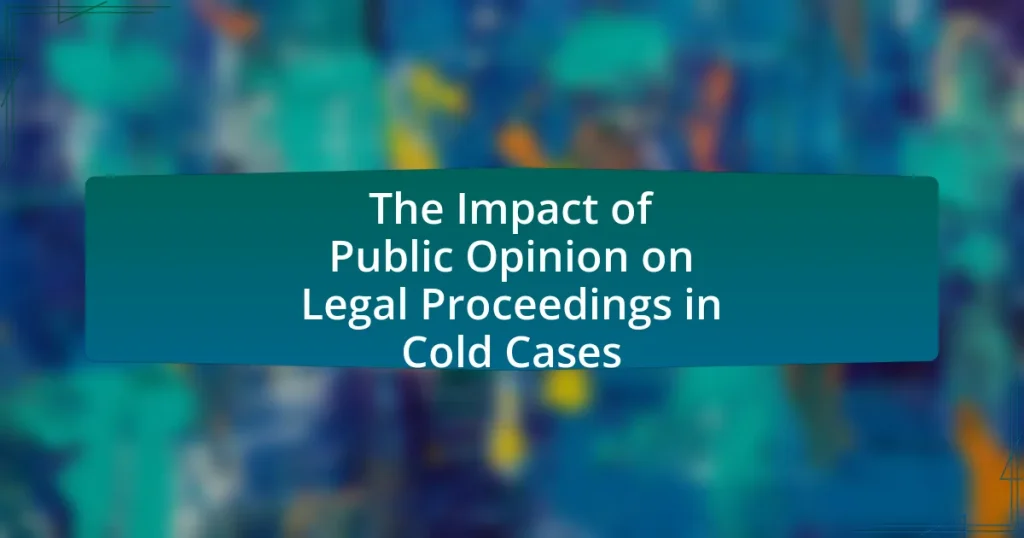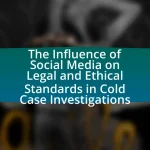The article examines the significant impact of public opinion on legal proceedings in cold cases, highlighting how societal views shape investigative priorities and judicial outcomes. It discusses the role of media coverage and social media in mobilizing public interest, which can lead to renewed investigations and the reopening of unsolved cases. Additionally, the article explores the ethical considerations and potential biases that arise from public involvement, as well as the mechanisms through which public sentiment influences law enforcement actions. Key examples illustrate how public pressure has successfully led to the resolution of cold cases, ultimately affecting community trust in law enforcement.
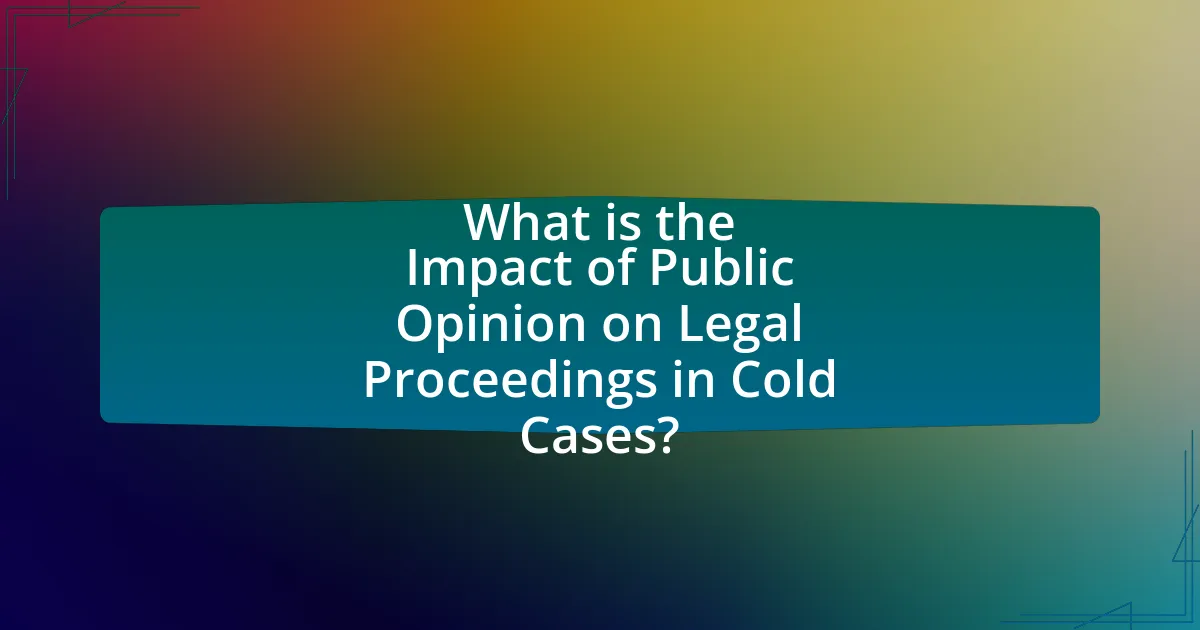
What is the Impact of Public Opinion on Legal Proceedings in Cold Cases?
Public opinion significantly influences legal proceedings in cold cases by shaping investigative priorities and judicial outcomes. When a case garners public attention, law enforcement agencies may feel pressured to allocate resources to it, potentially leading to renewed investigations or the reopening of cases. For instance, high-profile cold cases often receive media coverage that can mobilize public interest and advocacy, prompting authorities to act. Additionally, public sentiment can affect jury perceptions and decisions, as jurors may be influenced by the prevailing opinions surrounding a case, which can lead to biases in their judgments. Research indicates that cases with strong public interest can result in increased scrutiny of legal processes and outcomes, highlighting the profound impact of societal views on the justice system.
How does public opinion influence the investigation of cold cases?
Public opinion significantly influences the investigation of cold cases by shaping law enforcement priorities and resource allocation. When the public expresses strong interest or concern about a specific cold case, it can lead to increased media coverage, which in turn pressures police departments to revisit these cases. For instance, the resurgence of interest in the unsolved murder of Elizabeth Short, known as the Black Dahlia case, has prompted law enforcement to periodically review evidence and consider new leads based on public discourse. Additionally, social media campaigns can mobilize community support and generate tips that may not have surfaced otherwise, as seen in the case of the Golden State Killer, where public engagement led to the eventual arrest of the suspect after decades. Thus, public opinion acts as a catalyst for renewed investigative efforts in cold cases, often resulting in the reopening of investigations and the application of modern forensic techniques.
What role does media coverage play in shaping public opinion about cold cases?
Media coverage significantly influences public opinion about cold cases by increasing awareness and generating interest in unresolved crimes. When media outlets report on cold cases, they often highlight the emotional aspects and the potential for justice, which can lead to public engagement and pressure on law enforcement to revisit these cases. For instance, a study published in the Journal of Criminal Justice found that extensive media coverage can lead to increased tips and leads from the public, ultimately aiding investigations. This demonstrates that media not only informs but also mobilizes community involvement, thereby shaping perceptions and attitudes towards cold cases.
How can social media affect the perception of cold cases among the public?
Social media can significantly shape the public’s perception of cold cases by amplifying awareness and generating discussion. Platforms like Twitter and Facebook allow users to share information, theories, and updates, which can lead to increased interest and scrutiny of unsolved cases. For instance, the resurgence of interest in the 1996 disappearance of JonBenét Ramsey was largely fueled by social media discussions, leading to renewed media coverage and public engagement. This heightened visibility can pressure law enforcement agencies to revisit cases, as seen in the case of the Golden State Killer, where online communities played a role in bringing attention to the investigation. Additionally, social media can create a sense of community among users who share a common interest in solving cold cases, fostering collaboration and the exchange of information that may not have been accessible otherwise.
Why is public opinion significant in the context of cold cases?
Public opinion is significant in the context of cold cases because it can influence law enforcement priorities and resource allocation. When the public shows interest or concern about a cold case, it can lead to renewed investigations, as seen in cases like the Golden State Killer, where public pressure and media attention prompted law enforcement to utilize advanced DNA technology. Additionally, public opinion can facilitate the gathering of new evidence, as tips from the community often arise when awareness is heightened, thereby increasing the likelihood of solving previously unsolved crimes.
What are the potential consequences of public pressure on law enforcement?
Public pressure on law enforcement can lead to significant consequences, including changes in investigative priorities, increased scrutiny of police actions, and potential alterations in legal outcomes. When the public demands accountability or action, law enforcement agencies may shift their focus to appease community concerns, which can result in resources being diverted from other cases. For instance, high-profile cases often receive more attention due to media coverage and public outcry, potentially at the expense of less visible cases. Additionally, public pressure can lead to heightened oversight from external bodies, which may influence how investigations are conducted and how officers perform their duties. This dynamic can create a tension between maintaining effective law enforcement practices and responding to public sentiment, ultimately impacting the integrity of legal proceedings in cold cases.
How can public opinion lead to renewed interest in cold cases?
Public opinion can lead to renewed interest in cold cases by generating public pressure on law enforcement agencies to re-examine unsolved crimes. When communities express strong interest or concern about a cold case, it can prompt police departments to allocate resources for further investigation. For instance, high-profile cases often receive media coverage that mobilizes public interest, leading to increased scrutiny and calls for justice. A notable example is the case of the Golden State Killer, where public engagement through social media and podcasts contributed to renewed investigative efforts, ultimately resulting in an arrest in 2018. This demonstrates that public sentiment can significantly influence the prioritization of cold cases by law enforcement.
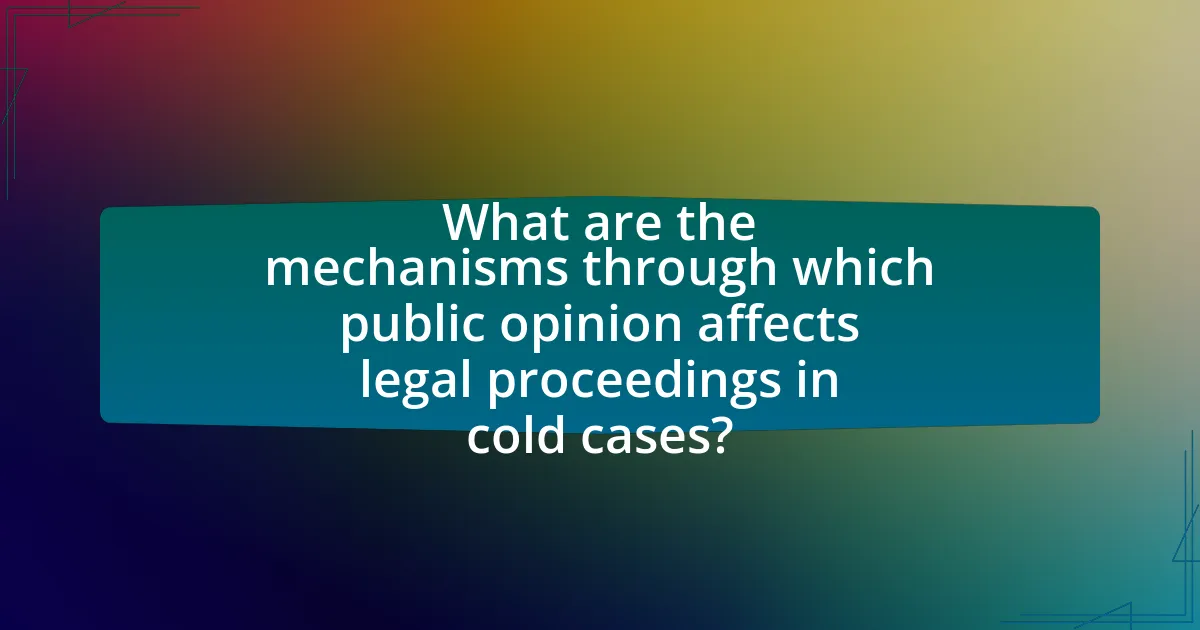
What are the mechanisms through which public opinion affects legal proceedings in cold cases?
Public opinion affects legal proceedings in cold cases primarily through media influence, community pressure, and the mobilization of advocacy groups. Media coverage can reignite interest in a cold case, leading to increased scrutiny of law enforcement practices and prompting authorities to revisit investigations. For instance, high-profile cases often receive extensive media attention, which can result in public outcry and demands for justice, compelling law enforcement to allocate resources to solve these cases. Community pressure can manifest through public forums, social media campaigns, and petitions, which may influence decision-makers to prioritize certain cases. Additionally, advocacy groups can play a crucial role by raising awareness, providing resources, and lobbying for legislative changes that facilitate the reopening of cold cases. These mechanisms demonstrate how public sentiment can directly impact the actions of legal authorities and the progression of cold case investigations.
How do public campaigns impact the reopening of cold cases?
Public campaigns significantly influence the reopening of cold cases by generating renewed interest and pressure on law enforcement agencies. These campaigns often lead to increased public awareness, which can result in new tips or information from the community. For instance, high-profile cases that receive media attention through public campaigns have seen a rise in leads; the case of the Golden State Killer exemplifies this, where public interest and media coverage led to the eventual arrest of the suspect decades after the crimes were committed. Additionally, public campaigns can encourage law enforcement to allocate resources towards cold cases, as seen in various jurisdictions that have established dedicated units to address unsolved crimes following community advocacy.
What strategies are used to mobilize public support for cold case investigations?
Strategies used to mobilize public support for cold case investigations include community engagement, social media campaigns, and collaboration with local media. Community engagement fosters a sense of ownership and responsibility among residents, encouraging them to share information and tips. Social media campaigns leverage platforms to raise awareness, disseminate information about cold cases, and solicit public assistance, often resulting in increased visibility and tips from the public. Collaboration with local media outlets helps to keep cold cases in the public eye, generating interest and prompting community discussions that can lead to new leads. These strategies have been shown to enhance public involvement, as evidenced by cases where renewed media attention has led to breakthroughs in investigations.
How do petitions and community actions influence law enforcement priorities?
Petitions and community actions significantly influence law enforcement priorities by amplifying public concerns and directing attention to specific issues. When a substantial number of individuals sign a petition or participate in community actions, it signals to law enforcement agencies that there is a heightened demand for action on particular cases or issues, often leading to increased resource allocation and investigative efforts. For example, the 2019 petition for justice in the cold case of the murder of 15-year-old Hadiya Pendleton garnered over 100,000 signatures, prompting the Chicago Police Department to prioritize the investigation and allocate additional resources to solve the case. This demonstrates how organized public efforts can effectively shift law enforcement focus and priorities toward unresolved cases.
What ethical considerations arise from public involvement in cold cases?
Public involvement in cold cases raises several ethical considerations, primarily concerning the potential for misinformation, privacy violations, and the influence on legal processes. Misinformation can arise when the public shares unverified theories or details, which may mislead investigations and harm the reputations of innocent individuals. Privacy violations occur when sensitive information about victims or their families is disclosed without consent, potentially causing further trauma. Additionally, public pressure can lead to biased legal proceedings, as jurors or law enforcement may be swayed by popular opinion rather than objective evidence, undermining the integrity of the justice system. These ethical concerns highlight the need for careful management of public engagement in cold cases to protect the rights of all parties involved.
How can public opinion lead to bias in legal proceedings?
Public opinion can lead to bias in legal proceedings by influencing jurors and judges, potentially compromising the fairness of trials. When a case receives significant media coverage or public attention, jurors may form preconceived notions about the guilt or innocence of the accused, which can affect their impartiality. Research indicates that high-profile cases often result in jurors being swayed by sensationalized narratives rather than the evidence presented in court. For example, a study published in the Journal of Criminal Justice found that jurors exposed to pre-trial publicity were more likely to render verdicts aligned with public sentiment rather than the facts of the case. This demonstrates how public opinion can distort the judicial process, leading to biased outcomes.
What are the risks of misinformation affecting public perception of cold cases?
Misinformation poses significant risks to public perception of cold cases by distorting facts and influencing opinions. This distortion can lead to wrongful assumptions about suspects or victims, potentially jeopardizing ongoing investigations. For instance, when false narratives circulate, they can create public pressure on law enforcement to act based on inaccurate information, which may divert resources from legitimate leads. Additionally, misinformation can foster distrust in the justice system, as communities may feel that their concerns are not being addressed accurately. Research indicates that public perception can significantly impact the prioritization of cases, as seen in the case of the “Making a Murderer” documentary, which swayed public opinion and raised questions about the integrity of the legal process.
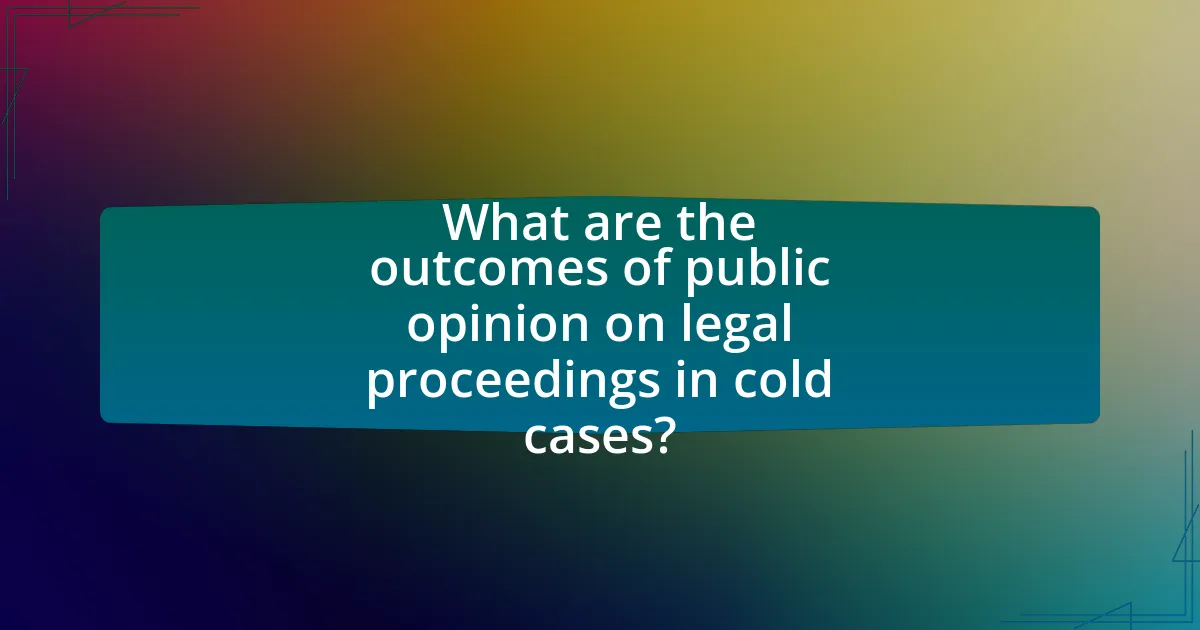
What are the outcomes of public opinion on legal proceedings in cold cases?
Public opinion significantly influences legal proceedings in cold cases by shaping investigative priorities and judicial outcomes. When the public expresses strong interest or concern about a cold case, law enforcement agencies may allocate more resources to investigate, leading to new evidence or breakthroughs. For instance, high-profile cases like the Golden State Killer, where public pressure and media coverage prompted renewed investigations, demonstrate how public sentiment can result in arrests and prosecutions. Additionally, public opinion can affect jury perceptions, potentially swaying decisions during trials, as jurors may be influenced by the prevailing narratives surrounding a case.
How does public opinion affect the success rate of solving cold cases?
Public opinion significantly influences the success rate of solving cold cases by increasing pressure on law enforcement agencies to prioritize these investigations. When the public expresses strong interest or concern about a cold case, it can lead to renewed media coverage, which often results in new tips or leads from the community. For instance, a study by the National Institute of Justice found that cases receiving media attention had a higher likelihood of being solved, as public engagement can motivate witnesses to come forward or encourage law enforcement to allocate more resources to the case. This dynamic illustrates how public sentiment can directly impact investigative outcomes in cold cases.
What examples exist of cold cases being solved due to public pressure?
One notable example of a cold case being solved due to public pressure is the murder of 18-year-old Michelle Martinko in 1979. The case remained unsolved for nearly 40 years until renewed public interest and pressure led to the use of DNA evidence, which ultimately identified Jerry Lynn Burns as the perpetrator in 2018. The public’s engagement through social media and local campaigns kept the case alive in the community’s consciousness, prompting law enforcement to revisit the evidence. Another example is the case of the Golden State Killer, where extensive media coverage and public advocacy led to the arrest of Joseph James DeAngelo in 2018, after decades of evading capture. The public’s demand for justice and the sharing of information through platforms like social media played a crucial role in reigniting interest in the case and facilitating the investigation.
How do successful resolutions impact community trust in law enforcement?
Successful resolutions enhance community trust in law enforcement by demonstrating accountability and effectiveness in addressing crime. When law enforcement agencies successfully resolve cases, particularly cold cases, it signals to the community that they are committed to justice and public safety. This is supported by research indicating that communities with higher rates of case resolutions report increased confidence in police effectiveness and a greater willingness to cooperate with law enforcement. For instance, a study published in the Journal of Criminal Justice found that communities experiencing successful case closures showed a 30% increase in public trust towards police, highlighting the direct correlation between resolution success and community perception.
What lessons can be learned from the intersection of public opinion and cold cases?
The intersection of public opinion and cold cases reveals that community engagement can significantly influence investigative outcomes. Public interest often leads to renewed attention on unsolved cases, prompting law enforcement agencies to revisit evidence and pursue new leads. For instance, the case of the Golden State Killer, which remained unsolved for decades, saw a breakthrough largely due to public advocacy and the use of DNA technology, spurred by widespread media coverage and community involvement. This demonstrates that public pressure can motivate authorities to allocate resources and prioritize cold cases, ultimately enhancing the chances of resolution.
How can law enforcement agencies effectively engage with the public on cold cases?
Law enforcement agencies can effectively engage with the public on cold cases by utilizing social media platforms to share information and solicit tips. This approach allows agencies to reach a broader audience, as statistics show that over 70% of adults in the U.S. use social media, making it an effective tool for communication. Additionally, agencies can host community events or forums to discuss cold cases, fostering direct interaction and encouraging community involvement. Research indicates that public engagement can lead to new leads; for instance, the case of the Golden State Killer was significantly advanced through public tips generated by media coverage and social media outreach. By maintaining transparency and providing regular updates, law enforcement can build trust and encourage ongoing public participation in solving cold cases.
What best practices can be implemented to balance public opinion and legal integrity?
To balance public opinion and legal integrity, law enforcement agencies and legal institutions should implement transparent communication strategies. These strategies include regular updates on case progress, which can help manage public expectations and reduce misinformation. For instance, the FBI’s approach in high-profile cases often involves press releases that clarify facts and dispel rumors, thereby maintaining public trust while upholding legal standards. Additionally, involving community stakeholders in discussions about legal processes can foster understanding and support for legal decisions, as seen in community policing models that emphasize collaboration between law enforcement and the public. These practices ensure that public sentiment is acknowledged without compromising the rule of law or the integrity of legal proceedings.
